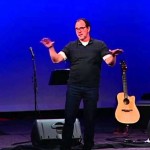We run our website the way we wished the whole internet worked: we provide high quality original content with no ads. We are funded solely by your direct support. Please consider supporting this project.
Isn’t it contradictory to say Jesus is “fully God” and “fully human”?
READER: God is, by definition, eternal, having neither beginning nor end. Human beings are, by definition, finite, beginning at a certain point in time. How, then, can Jesus be both God (eternal) and human (finite)? Isn’t that a contradiction? Similarly, while God is omniscient, humans aren’t. How could Jesus be both omniscient God and non-omniscient human? When Jesus was a little zygote in the womb of Mary, did he also know what was happening on some planet at the other end of the universe?
GREG: Great question! Theologians have worked through the paradox of Jesus being “fully God and fully human” in a number of different ways. The most traditional way is sometimes called a “two minds Christology.” This view affirms that Jesus was, on some level, aware of what was happening on every planet in the universe while he was a zygote in the womb of Mary, even while he was completely unaware of everything outside the womb on another level. I myself have never been able to render this view coherent.
A different approach to this paradox has been labeled “kenotic Christology,” based on the word kenosis, which is Greek for “to empty.” It’s used in Philippians 2 when Paul says Jesus didn’t cling to his divine prerogatives, but instead emptied himself and became a human. The kenotic Christology says that what the Son of God emptied himself of was the exercise of all the divine attributes that are incompatible with being a human. So the Son of God divested himself of his omniscience, omnipresence, and omnipotence to become a genuine human who had limited knowledge, took up limited space, and had limited power.
This view obviously means that God doesn’t need to always exercise his divine attributes to be God. Anyone who believes that humans are created with free will, as I do, should have no problem with this notion, for the only way God could give humans free will is by limiting his omnipotence. Creating a world with free agents thus involves a sort of “kenosis” in God. The kenotic Christology simply takes this logic a bit further and applies it to the incarnation. Just as God limited his power when he created free agents, so too the Son of God limited his power, knowledge, and presence to become a full human being. What the Son of God did not set aside is his perfect divine love, for there’s nothing contradictory about a human loving others perfectly. To the contrary, teaching and empowering humans to love like God is one of God’s central goals for creation.
To me, the kenotic Christology makes more sense and fits the biblical data better than the traditional “two minds” Christology. I offer it in hope that it will help you understand how there is no contradiction involving in affirming Jesus to be fully God and fully human.
Category: Q&A
Tags: Incarnation, Jesus, Q&A, Theology
Topics: Christology, Jesus: Lord or Legend
Related Reading

How do you respond to Matthew 21:1–5?
Jesus commanded his disciples, “Go into the village ahead of you, and immediately you will find a donkey tied, and a colt with her; untie them and bring them to me. If anyone says anything to you, just say this: ‘The Lord needs them.’ And he will send them immediately” (vs. 1-4). Though this verse…

Interview with Frank Viola on his Book “God’s Favorite Place on Earth”
Today is the release date for Frank Viola’s new book, God’s Favorite Place on Earth. Greg did an interview with Frank recently, and in celebration of his book release, we’re sharing that interview here. If you read to the end you’ll see how you can get 25 free gifts if you purchase the book from…

In your Anabaptist view, should Christians get involved in politics at all? Do you think they should even vote?
Ultimately, each person must follow their conscience when it comes to whether or not they vote, how they vote if they decide to vote, and the extent to which they should involve themselves in the political system. But we must always remain aware of the dangers involved in participating in the political system, for it…

How do you respond to Genesis 3:15?
The Lord promises that he will “put enmity between you [the serpent] and the woman, and between your offspring and hers; he will strike your head, and you will strike his heel.” This is commonly considered the first messianic prophecy of the Bible. What a glorious and gracious picture of God we are given here!…

Sermon Clip: Through Samaria
In this final installment of the Women on the Outside series, we explore the story of the woman at the well Jesus encountered while traveling through Samaria and how he dives right in to the gender and racial tensions of the first century Jewish culture. You can listen/watch the full sermon here: http://whchurch.org/sermons-media/sermon/through-samaria

Don’t all religions believe in the same God?
http://youtu.be/BKmSr6lKWsk Bruxy Cavey takes a swing at this question and scores a home run.
